SWEDISH
SOUTH ASIAN STUDIES NETWORK
Newsletter 82:
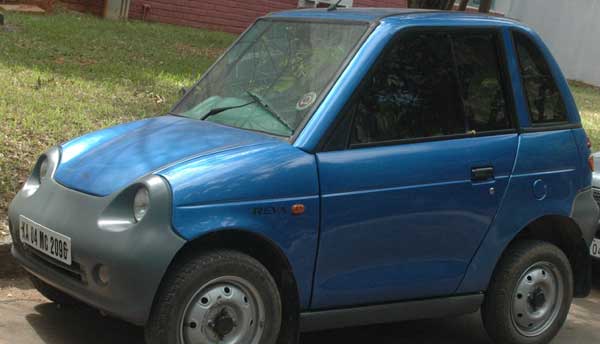 27 February 2008
27 February 2008
| Educational News |
| Politics and Business |
| South Asia related Culture |
| New and updated information |
• Time to apply for SASNET grants
 Applications are now invited for the 2008 round of SASNET grants. Closing date for applications is
15 June 2008. There are three kinds of grants offered by SASNET:
Applications are now invited for the 2008 round of SASNET grants. Closing date for applications is
15 June 2008. There are three kinds of grants offered by SASNET:
– 1. Networking grants for planning new research and/or
education programmes or projects in collaboration between Swedish and South Asian partners;
– 2. Guest lecture programme grants (for inviting a guest lecturer
from South Asia to visit Swedish
universities), and
– 3. Grants for organising South Asia related interdisciplinary research
workshops either in Sweden or in South Asia.
Please note that the main applicant must always be
a researcher or teacher based at a Swedish university. All previously distributed SASNET grants are presented on our web page (go for the complete list).
Decisions will be taken in late August 2008. More information.
• Soumyajit Samantha lectures about Indian literature
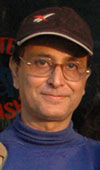 Dr. Soumyajit Samantha from North Bengal University in Siliguri, India, holds a SASNET lecture in Lund on Monday 10 March 2008, 18.30–20.00. He will lecture on ”From Salman Rushdie to Arundhati Roy – Modern Indian Novels as Analysis of
Changing India and as World Literature”. The seminar is organised in collaboration with the Association of Foreign Affairs (UPF) and the Dept. of Comparative Literature, Lund University. Dr. Samantha has been invited to Sweden with the help of a SASNET guest lecture tour grant, to hold lectures at Lund University and Växjö University. Venue: Atriumgården, Stadsbiblioteket, Lund. More information.
Dr. Soumyajit Samantha from North Bengal University in Siliguri, India, holds a SASNET lecture in Lund on Monday 10 March 2008, 18.30–20.00. He will lecture on ”From Salman Rushdie to Arundhati Roy – Modern Indian Novels as Analysis of
Changing India and as World Literature”. The seminar is organised in collaboration with the Association of Foreign Affairs (UPF) and the Dept. of Comparative Literature, Lund University. Dr. Samantha has been invited to Sweden with the help of a SASNET guest lecture tour grant, to hold lectures at Lund University and Växjö University. Venue: Atriumgården, Stadsbiblioteket, Lund. More information.
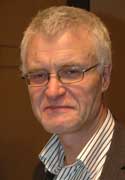 |
 |
| Hans Blomkvist and Katrin Uba. | |
• Joint SASNET seminar with Hans Blomkvist and Katrin Uba
Dr. Hans Blomkvist and Dr. Katrin Uba from the Dept. of Government, Uppsala University, holds a joint SASNET seminar in Lund on Thursday 13 March 2008, 13.15–15.00. Prof. Blomkvist, currently doing research on institutions and political decision making in India on energy and bioenergy in particular, will talk about ”Energy Challenges in India's Rapidly
Growing Economy”. Dr. Uba, who defended her PhD thesis in 2007 on political activism in developing countries, will talk about ”Protests against privatisation
and their outcomes in India”. Her presentation provides an overview of the privatisation process in India from 1991 till 2003, actors opposing the process, and the eventual impact of protest mobilisation. Venue: Java Hall, Ideon Alfa 1 building, Scheelevägen 15 B, ground floor (next to the Asia Library), Lund. More information.
• Anirudh Krishna lectures about Roots of Development and Democracy in India
Dr. Anirudh Krishna, Associate Professor of Public Policy and Political Science at the Sanford Institute of Public Policy, Duke University, Durham, N.C., USA holds a lecture in Lund on Tuesday 1 April 2008, 19.00. The lecture, jointly organised by SASNET and the Association of Foreign Affairs at Lund University (UPF), is titled ”Active Social Capital: Tracing the Roots of Development and Democracy in India”, which is also the title of Dr. Krishna’s recently published book. During the academic year 2007/08, Dr. Krishna is on sabbatical leave from Duke University, instead being Olof Palme Visiting Professor at Uppsala University. Venue: Edens hörsal, Dept. of Political Science, Paradisgatan 5, Lund. More information about Dr. Krishna.
• Venkatesh Athreya lectures about Wealth and Poverty in
India
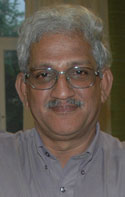 Professor Venkatesh B. Athreya, Economics Department at Bharathidasan University, Tiruchirapalli, India, holds a SASNET lecture at Lund University, on Monday 12 May 2008, 19.00–21.00. The lecture, jointly organised by SASNET and the Association of Foreign Affairs at Lund University (UPF), is titled ”Wealth and Poverty in
Rapidly Globalising India”. Among Prof. Athreya’s most well-known publications are ”Literacy and Empowerment” (with Sheela Rani Chunk, Sage Publications, 1996) and ”Barriers Broken” (with G. Djurfeldt and S. Lindberg, Sage Publications, 1990). Currently he is co-operating with the sociologists Göran Djurfeldt and Staffan Lindberg at Lund University in a restudy of 300 agricultural households in Tiruchirapalli District, Tamil Nadu, people who were originally interviewed in 1979/80. Venue: Athen, AF-Borgen, Sandgatan 2, Lund. More information (as a pdf-file)
Professor Venkatesh B. Athreya, Economics Department at Bharathidasan University, Tiruchirapalli, India, holds a SASNET lecture at Lund University, on Monday 12 May 2008, 19.00–21.00. The lecture, jointly organised by SASNET and the Association of Foreign Affairs at Lund University (UPF), is titled ”Wealth and Poverty in
Rapidly Globalising India”. Among Prof. Athreya’s most well-known publications are ”Literacy and Empowerment” (with Sheela Rani Chunk, Sage Publications, 1996) and ”Barriers Broken” (with G. Djurfeldt and S. Lindberg, Sage Publications, 1990). Currently he is co-operating with the sociologists Göran Djurfeldt and Staffan Lindberg at Lund University in a restudy of 300 agricultural households in Tiruchirapalli District, Tamil Nadu, people who were originally interviewed in 1979/80. Venue: Athen, AF-Borgen, Sandgatan 2, Lund. More information (as a pdf-file)
• All reports from SASNET’s contact journey to India published
The complete reports from Anna Lindberg’s and Lars Eklund’s November 2007 contact journey to India are now published on SASNET’s web site.
Totally, they visited more than 30 important universities and
research institutions in Northern and Western/Southwestern India.
The ambition was to promote Indo-Swedish researcher cooperation
and student exchange in all fields, from medicine/natural sciences
to social sciences/humanities. A large number of fruitful meetings
were held in all the places visited, including Delhi, Thiruvananthapuram,
Kottayam, Kozhikode, Mumbai, Loni, Pune, Bangalore and Mysore.
In New Delhi, the Swedish Embassy also organised a reception/dinner
for the academic world in honour of the visiting SASNET delegation. Read the detailed travel report, with links to 33 special reports from each and every institution visited by SASNET’s Director and Deputy Director.
• Uppsala research conference on Nature, Knowledge, Power
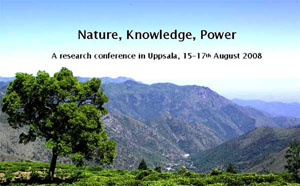 A research conference titled ”Nature, Knowledge, Power”, aiming at bringing together researchers from different academic fields, concerned with questions of environment and society under present and historical conditions, will be held in Uppsala 15–17 August 2008. The conference is
co-organised by SASNET, the Dept. for Rural and Urban Development at the Swedish University for Agricultural Sciences (SLU), and Uppsala Centre for Sustainable Development (CSD). The themes for the sessions are: – Energy: renewable and sustainable?; Competing rights, codifying law; – Community rights under neoliberal rule; – Who needs conservation? Nature, people, survival ; – Contested urban environments; and – Ideologies of environmental change: from imperial modernization to postcolonial social equality? Deadline for applications to the conference is 31 March 2008. More information.
A research conference titled ”Nature, Knowledge, Power”, aiming at bringing together researchers from different academic fields, concerned with questions of environment and society under present and historical conditions, will be held in Uppsala 15–17 August 2008. The conference is
co-organised by SASNET, the Dept. for Rural and Urban Development at the Swedish University for Agricultural Sciences (SLU), and Uppsala Centre for Sustainable Development (CSD). The themes for the sessions are: – Energy: renewable and sustainable?; Competing rights, codifying law; – Community rights under neoliberal rule; – Who needs conservation? Nature, people, survival ; – Contested urban environments; and – Ideologies of environmental change: from imperial modernization to postcolonial social equality? Deadline for applications to the conference is 31 March 2008. More information.
• More information about SASNET and its
activities
See SASNET’s page, http://www.sasnet.lu.se/sasnet.html
• Difficulties in obtaining research visas in focus for discussion with Indian Prime Minister
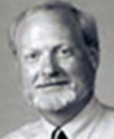 In April 2008, Professor James Manor, Institute of Commonwealth Studies, University of London, UK, will visit the Indian Prime Minister's Office in New Delhi, partly to convey concerns among India specialists (historians and social scientists) in Britain about the difficulties that non-Indian students and more senior academics face in obtaining research visas. Prof. James Manor has had a distinguished career in the academic & policy worlds. His recent work has focused on civil society and
governance, the politics of poverty reduction, democratic decentralization in a diversity
of systems and conflict in South Asia. He has previously taught at Yale, Harvard, and Sussex Universities. In India, he is connected to the Institute for Social and
Economic Change (ISEC) in Bangalore, where he is the VKRV Rao Chair Professor.
In April 2008, Professor James Manor, Institute of Commonwealth Studies, University of London, UK, will visit the Indian Prime Minister's Office in New Delhi, partly to convey concerns among India specialists (historians and social scientists) in Britain about the difficulties that non-Indian students and more senior academics face in obtaining research visas. Prof. James Manor has had a distinguished career in the academic & policy worlds. His recent work has focused on civil society and
governance, the politics of poverty reduction, democratic decentralization in a diversity
of systems and conflict in South Asia. He has previously taught at Yale, Harvard, and Sussex Universities. In India, he is connected to the Institute for Social and
Economic Change (ISEC) in Bangalore, where he is the VKRV Rao Chair Professor.
He will be speaking with the Indian Prime Minister on behalf of the British Academy's South Asia Panel, but he has asked for comments from researchers and students in North America, Europe and Australia if they have have encountered similar problems with visas, and whether they perceive the situation to be deteriorating. British colleagues speak of two main problems: delays and refusals. The delays appear to be the result of complex processes which require more than one ministry in the Government of India to approve visa applications. The refusals are thought to result from excessive sensitivity, and some believe that these difficulties have actually become more serious in very recent times. They find this surprising because they expected the change of government in 2004 to improve things. Any comments should be communicated to Prof. James Manor.
• Mob ransacked the history department at University of Delhi
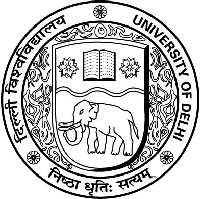 On Monday 25 February 2008, an organised mob led by activists belonging to the Akhil Bharatiya Vidyarthi Parishad (ABVP, the student wing of the Bharatiya Janata Party) ransacked the Dept. of History at Delhi University (DU). The ABVP mob clashed with students and faculty at the department in protest against a recommended text for study by second year BA Honours students. ABVP refers to the ‘Three Hundred Ramayanas. Five Examples and Three Thoughts on Translation’, an essay written by the late Dr. A K Ramanujan (a widely acclaimed scholar with impeccable academic
credentials, and with an expertise in a range of languages including Sanskrit,
Tamil and Kannada), in which
he stressed how there are and all along have been many
versions of the famous Ramayana epic. No less than two dozen compositions exist in
Sanskrit alone. It is recited and written in 25 languages in south-east and south Asia. The ABVP and other right wing groups claim that the essay is derogatory towards Hindu gods and goddesses.
Part of the fury from the ABVP’s side also stems from a false allegation that Dr. Ramanujan’s text and other papers have been compiled into a book by Prof. Upinder Singh, a historian at DU and daughter of Prime Minister Manmohan Singh. Upinder Singh was on campus when the vandalism occurred, and had to be escorted out by the Special Protection Group.
The day after, on Tuesday 26 February, more than 2 000 students and teachers participated in a demonstration against the vandalism.
The marchers made it clear no change in the syllabus would be made under intimidation. At the same time, the Dept. of History has been given paramilitary protection.
On Monday 25 February 2008, an organised mob led by activists belonging to the Akhil Bharatiya Vidyarthi Parishad (ABVP, the student wing of the Bharatiya Janata Party) ransacked the Dept. of History at Delhi University (DU). The ABVP mob clashed with students and faculty at the department in protest against a recommended text for study by second year BA Honours students. ABVP refers to the ‘Three Hundred Ramayanas. Five Examples and Three Thoughts on Translation’, an essay written by the late Dr. A K Ramanujan (a widely acclaimed scholar with impeccable academic
credentials, and with an expertise in a range of languages including Sanskrit,
Tamil and Kannada), in which
he stressed how there are and all along have been many
versions of the famous Ramayana epic. No less than two dozen compositions exist in
Sanskrit alone. It is recited and written in 25 languages in south-east and south Asia. The ABVP and other right wing groups claim that the essay is derogatory towards Hindu gods and goddesses.
Part of the fury from the ABVP’s side also stems from a false allegation that Dr. Ramanujan’s text and other papers have been compiled into a book by Prof. Upinder Singh, a historian at DU and daughter of Prime Minister Manmohan Singh. Upinder Singh was on campus when the vandalism occurred, and had to be escorted out by the Special Protection Group.
The day after, on Tuesday 26 February, more than 2 000 students and teachers participated in a demonstration against the vandalism.
The marchers made it clear no change in the syllabus would be made under intimidation. At the same time, the Dept. of History has been given paramilitary protection.
Frank F. Conlon, Professor Emeritus of History, South Asian
Studies & Comparative Religion,
University of Washington, USA, has written a summary of the controversy on the H-ASIA, a discussion forum on Asian History and Studies, part of the Humanities & Social Sciences OnLine network (H-Net). Prof. Conlon is the Co-editor for H-ASIA. Read Prof. Conlon’s contribution (as a pdf-file).
• Major funding for Sustainable Arsenic Mitigation projects in Bangladesh and India
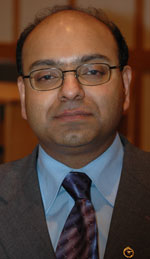 In December 2007, Dr. Prosun Bhattacharya, Dept. of Land and Water Resources
Engineering, Royal Institute of Technology (KTH), Stockholm, received SEK 9.4 million as a major grant from the Department of Natural Resources and the Environment within the Swedish International Development Cooperation Agency (Sida), for a four-years project (2007-10) titled ”Sustainable Arsenic Mitigation (SASMIT). Community driven initiatives to target arsenic safe groundwater as sustainable mitigation strategy”. The project will be carried out in collaboration with the University of Dhaka, the NGO Forum for Drinking Water Supply & Sanitation (based in Dhaka, Bangladesh), other partners at the Royal Institute of Technology (KTH) in Stockholm, and the private company Ramboll Natura AB. The main objectives of the
project are to i) increase global awareness of the problems associated
with high arsenic groundwater of geogenic origin, ii) exchange
experiences regarding feasibility of mitigation options and iii) develop a
sustainable option for safe drinking water for rural and disadvantaged
communities, through targeting safe aquifers in regions with high
arsenic groundwater of geogenic origin for installation of community
hand tube wells. Action research will be conducted in Matlab Upazila,
Bangladesh. More information.
In December 2007, Dr. Prosun Bhattacharya, Dept. of Land and Water Resources
Engineering, Royal Institute of Technology (KTH), Stockholm, received SEK 9.4 million as a major grant from the Department of Natural Resources and the Environment within the Swedish International Development Cooperation Agency (Sida), for a four-years project (2007-10) titled ”Sustainable Arsenic Mitigation (SASMIT). Community driven initiatives to target arsenic safe groundwater as sustainable mitigation strategy”. The project will be carried out in collaboration with the University of Dhaka, the NGO Forum for Drinking Water Supply & Sanitation (based in Dhaka, Bangladesh), other partners at the Royal Institute of Technology (KTH) in Stockholm, and the private company Ramboll Natura AB. The main objectives of the
project are to i) increase global awareness of the problems associated
with high arsenic groundwater of geogenic origin, ii) exchange
experiences regarding feasibility of mitigation options and iii) develop a
sustainable option for safe drinking water for rural and disadvantaged
communities, through targeting safe aquifers in regions with high
arsenic groundwater of geogenic origin for installation of community
hand tube wells. Action research will be conducted in Matlab Upazila,
Bangladesh. More information.
Earlier the same year, in June 2007, Dr. Bhattacharya also received a so-called Joint Formas–SAREC grant for research on sustainable development in developing countries for a three-years project (2007-09) titled ”Groundwater arsenic in Chhattisgarh, Central India and options for sustainable arsenic-safe drinking water supplies”. The project will be carried out in collaboration between the KTH-International Groundwater Research Group (GARG), and Pandit Ravi Shankar Shukla University (PRSU) in Raipur, Chattisgarh state, India. More information, with a project summary.
• Formas funding for projects on ecology and epidemiology
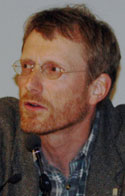 In November 2007, the Swedish Research Council for Environment, Agricultural Sciences and Spatial Planning (Formas), decided
upon the 2007 grants applications. A couple of South Asia related research projects were given funding. Prof. Alf Hornborg (photo), Human Ecology Division, Lund University, received a grant for a project titled ”Power, Land, and Materiality: Global Studies in Historical-Political Ecology as a Framework for Assessing Policies for "Sustainable Development"”, involving 10 researchers from universities in Lund, Göteborg, Stockholm, and Uppsala. Sub-studies will be made in several countries, and in South Asia Dr. Mats Mogren from the Dept. of Archaeology, Lund University, will do a study focusing on Sri Lanka. His project is titled ”Plantation Colonialism and the Change of Landscape in Sri Lanka. A historical-archaeological case study”.
In November 2007, the Swedish Research Council for Environment, Agricultural Sciences and Spatial Planning (Formas), decided
upon the 2007 grants applications. A couple of South Asia related research projects were given funding. Prof. Alf Hornborg (photo), Human Ecology Division, Lund University, received a grant for a project titled ”Power, Land, and Materiality: Global Studies in Historical-Political Ecology as a Framework for Assessing Policies for "Sustainable Development"”, involving 10 researchers from universities in Lund, Göteborg, Stockholm, and Uppsala. Sub-studies will be made in several countries, and in South Asia Dr. Mats Mogren from the Dept. of Archaeology, Lund University, will do a study focusing on Sri Lanka. His project is titled ”Plantation Colonialism and the Change of Landscape in Sri Lanka. A historical-archaeological case study”.
Professor Annika Rosengren, Department of Emergency and Cardiovascular Medicine at Sahlgrenska Academy, Göteborg University, is another researcher to be funded by Formas for the period up to 2010. She coordinates a project titled ”PURE – a Prospective Urban Rural Epidemiologic study”. More information on the Formas grants 2007.
• South Asia related projects funded by Joint Formas – Sida/SAREC programme
In June 2007, a number of South Asia related research projects were given funding from the so-called Joint Formas – Sida/SAREC programme for research
on sustainable development in developing countries. The programme aims
to promote participation of scientists from Sweden in sustainability
research in developing countries, with an overall intention to contribute
to global sustainable development in the spirit of the UN Conference
in Johannesburg 2002, and is administered by Formas, the Swedish Research Council for Environment, Agricultural Sciences and Spatial Planning.
The recipients of grants include Dr. Abul
Mandal, School of Life Sciences,
Skövde University, with a project on ”Genetic modification and development of a new variety of rice (Oryza sativa), the staple food in Bangladesh, for effective prevention of people and their environment from arsenic contamination”; Dr. Åsa Sjöling, Division of Medical Microbiology and Immunology, Institute of Biomedicine, Göteborg University, with a project on ”Detection and characterisation of pathogenic bacteria in water samples in Bangladesh”; Dr. Anna Godhe, Marine Botany, Department of Marine Ecology, Göteborg University, with a project on ”Inter-relation between bacteria and phytoplankton blooms in the Arabian Sea”; Dr. Gunaratna
Kuttuva Rajarao, Department of Applied Environmental Microbiology, School of Biotechnology,
Royal Institute of Technology (KTH), Stockholm, with a project on ”Development of sustainable, simple and inexpensive purification process using plant materials for safe drinking water for rural India”; Prof. Marie Vahter, Division of Metals & Health, Institute of Environmental Medicine;
Karolinska Institutet, Stockholm, with a project on ”Implementation of collaborative efforts to assess sources and consequences of exposure to toxic metals, with the aim to improve a sustainable development in Bangladesh”; Dr. Prosun Bhattacharya, Dept. of Land and Water Resources
Engineering, Royal Institute of Technology (KTH), Stockholm, with a project on ”Groundwater arsenic in Chhattisgarh, Central India and options for sustainable arsenic-safe drinking water supplies” (presented above); and Dr. Johan Burman, Marine Geology, Department of Earth Sciences, Göteborg University, with a projct on ”Indian paleomonsoon dynamics; linking high-resolution terrestrial and marine records”. More information.
• Sida/SAREC announces grants for 2009 only
![]() Grants
to support Swedish development research are provided by the Swedish
International Development Cooperation Agency, Sida,
through its Developing
Country Research Council (u-landsforskningsrådet).
Applications for 2009 are open from 12 February till 7 April 2008. Please note that you may only apply for one year of funding (2009) for research and post-doctoral projects. Funding for continued support to ongoing PhD projects can be up to 2 years and for Network projects up to 3 years. This is due to a planned major reform of the funding system from Sida from 2009 onwards. The decisions of the application
round will be announced before the end of October. More
information.
Grants
to support Swedish development research are provided by the Swedish
International Development Cooperation Agency, Sida,
through its Developing
Country Research Council (u-landsforskningsrådet).
Applications for 2009 are open from 12 February till 7 April 2008. Please note that you may only apply for one year of funding (2009) for research and post-doctoral projects. Funding for continued support to ongoing PhD projects can be up to 2 years and for Network projects up to 3 years. This is due to a planned major reform of the funding system from Sida from 2009 onwards. The decisions of the application
round will be announced before the end of October. More
information.
• Time to apply for grants from the Swedish
Research Council
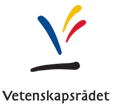 The Swedish
Research Council (Vetenskapsrådet) provides support for basic research
of the highest scientific quality in all fields of science.
Several South Asia related projects have been given grants in recent
years. Applications for grants for 2008 and subsequent years should be
given no later than: 2 April 2008 for projects within Humanities and
Social sciences; 8 April 2008 for projects within Medicine; 15 April 2008 for projects within Natural sciences and Technology; and 22 April
2008 for projects within Educational science, and for Research infrastructures.
Decisions will be taken in November 2008. Full
information on grants announced, requirements, instructions etc.
The Swedish
Research Council (Vetenskapsrådet) provides support for basic research
of the highest scientific quality in all fields of science.
Several South Asia related projects have been given grants in recent
years. Applications for grants for 2008 and subsequent years should be
given no later than: 2 April 2008 for projects within Humanities and
Social sciences; 8 April 2008 for projects within Medicine; 15 April 2008 for projects within Natural sciences and Technology; and 22 April
2008 for projects within Educational science, and for Research infrastructures.
Decisions will be taken in November 2008. Full
information on grants announced, requirements, instructions etc.
• Formas offers funding for environmental research
Every year, the Swedish Research Council for Environment, Agricultural Sciences
and Spatial Planning (Formas) announces grants for research and development projects within the fields of environment, agricultural
sciences, building sciences and urban development. The applications for the coming round, 2009–2011, will open in the beginning of March 2008. Deadline for applications will be Tuesday 29 April 2008. More information.
Formas also announces a number of regular grants that may be applied for at any time of the year, so-called Urgent grants, Travel grants, and Grants for conferences, symposia and workshops. More information.
• SASNET information about funding to Swedish South Asia related research
SASNET provides information about research and
planning grants available for South Asia related research,
provided by other funding agencies in Sweden, the Nordic countries
and worldwide on our web site. We also present specific web pages about South Asia related projects funded in recent years by Sida/SAREC, Swedish Research Council, etc. Go
to the funding page.
• Panel papers from the 2004 Lund conference now published
In November 2007, papers presented by Prof. Nils-Axel Mörner and colleagues at the 18th European Conference on Modern South Asian Studies (ECMSAS), organised by SASNET in Lund in 2004, were published in the journal Internationales Asienforum (International Quarterly for Asian Studies, Vol. 38, Issue 3-4). A section of the journal was devoted to the theme ”Environment and Ecology in South Asia: Past and Present”, with Michael Mann, Fern Universität in Hagen, Germany, being the guest editor. Michael Mann and Nils-Axel Mörner, Professor Emeritus in Paleogeophysics and Geodynamics from Stockholm University, were co-convening a panel at the Lund conference titled ”The stress on culture and ecology by past and present changes in environment” (more information about the panel).
Four papers from the panel are now published, Prof. Mörner’s
”Sea Level Changes and Tsunamis, Environmental Stress and Migration Overseas. The Case of the Maldives and Sri Lanka” – read the full paper; Iftekhar Iqbal’s ”The Railways and the Water Regime of the Eastern Bengal Delta, c1845–1943” – read the full paper; Bernardo A. Michael’s ”Land, Labour, Local Power and the Constitution of Agrarian Territories on the Anglo-Gorkha Frontier, 1700–1815”; and Golam Mahabub Sarwar’s ”Sea Level Rise. A Threat to the Coast of Bangladesh”. More information.
• INSTEC delegation visits India
The efforts to create INSTEC, a national network centre for Indo-Swedish Cooperation on Technical Research and Education, are proceeding well. The networking initiative, originally an idea born out of a contact journey by a Royal Institue of Technology (KTH) delegation to India in 2002, now consists of eight Swedish universities (Blekinge Institute of Technology; Chalmers University of Technology; Linköping University; Luleå University of Technology; Lund University, Swedish University of Agricultural Sciences; and Uppsala University, besides KTH), and one research institute – IVL (Swedish Environmental Research Institute). INSTEC is funded by the Swedish Governmental Agency for Innovation Systems, VINNOVA. In order to strenghten the work, INSTEC plans to set up a platform at the Indian Institute of Technology (IIT) Delhi, to establish an Indian network and a centre for environmental technology, and also organise a workshop to be held in collaboration with INSTEC’s Indian partners in 2008.
As a preparation for this, a delegation from the INSTEC member institutions will visit India in March-April 2008. More information about INSTEC.
•
Jussi Kauhanen new Chairman for Nordic Centre in India (NCI)
 The Nordic Centre in India (NCI) Consortium now consists
of 22 member universities in the Nordic countries (5 in Sweden,
3 in Norway, 4 in Denmark, 8 in Finland, 1 in Iceland, plus NIAS in Copenhagen).
NCI aims at supporting collaboration on research and education
between the Nordic countries and India. During the Summer 2008, NCI organises four summer
courses in India. Besides the 'Contemporary
India' course again to be held in Hyderabad, a course titled 'Approaching
the Environment' will be held in Bangalore (at the Institute
for Economic and Social Change, ISEC),and
a course titled 'Demography, Gender and
Reproductive Health' will be held in Mumbai (at the International
Institute for Population Sciences, IIPS). From this year, a new multidisciplinary training programme titled 'Methods and Applications in Social Science Research' will also be held at ISEC in Bangalore. The
deadline for applications is 15 April 2008. Each member university
nominate candidates and reserves for courses (more
information). At the NCI General Assembly held in Oslo in the Fall 2007, Jussi Kauhanen,
Professor of Public Health at the
University of Kuopio, Finland, was elected new Chairman of the NCI board. More
information about the Nordic Centre in India.
The Nordic Centre in India (NCI) Consortium now consists
of 22 member universities in the Nordic countries (5 in Sweden,
3 in Norway, 4 in Denmark, 8 in Finland, 1 in Iceland, plus NIAS in Copenhagen).
NCI aims at supporting collaboration on research and education
between the Nordic countries and India. During the Summer 2008, NCI organises four summer
courses in India. Besides the 'Contemporary
India' course again to be held in Hyderabad, a course titled 'Approaching
the Environment' will be held in Bangalore (at the Institute
for Economic and Social Change, ISEC),and
a course titled 'Demography, Gender and
Reproductive Health' will be held in Mumbai (at the International
Institute for Population Sciences, IIPS). From this year, a new multidisciplinary training programme titled 'Methods and Applications in Social Science Research' will also be held at ISEC in Bangalore. The
deadline for applications is 15 April 2008. Each member university
nominate candidates and reserves for courses (more
information). At the NCI General Assembly held in Oslo in the Fall 2007, Jussi Kauhanen,
Professor of Public Health at the
University of Kuopio, Finland, was elected new Chairman of the NCI board. More
information about the Nordic Centre in India.
• Swedish researchers in marine ecology organised workshop in Mangalore
Researchers from the Department of Marine Ecology at Göteborg University were involved in organising an International workshop on “Safety of Shellfish from Harmful Algae and Biotoxins” in Mangalore, India, 21–25 January 2008. The workshop was held at the UNESCO Microbial Resources Center (MIRCEN), College of Fisheries in Mangalore, and focused on the problem with harmful algal blooms and shellfish toxicities – a global problem affecting safety of shellfish and international trade. It is estimated that about 2000 cases of shellfish toxicities occur annually with 15% mortality. The workshop was jointly sponsored by FAO, the Swedish International Development Agency (Sida) and UNESCO MIRCEN. More information about the Mangalore workshop.
• Swedish Network of Peace, Conflict and Development Research extremely active
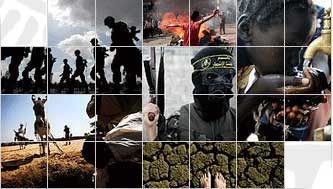 A
Swedish Network of Peace, Conflict and Development Research was
formed in 2005, funded by a grant from Sida/SAREC.
It is a joint effort of three university departments conducting
research on these topics, in Uppsala (Dept.
of Peace and Conflict Research), Göteborg (Dept.
of Peace and Development Research, PADRIGU, School of Global
Studies) and Umeå
(Peace
and Conflict Studies, Dept. of Political Science). The aim
of the network is to support Swedish research on peace and conflict
dimensions in developing studies, and to assist Swedish peace researchers
in collaboration with researchers in the developing world. The
network regularly organises important conferences on specific themes of high relevance. Among the conferences during the past years could be mentioned a November 2006 conference on ”Globalization and Peacebuilding”, with Prof. Niraja Gopal Jayal, Centre for the Study of Law and Governance, Jawaharlal Nehru University (JNU), New Delhi, as one of the keynote speakers. This conference included a panel on ”The State of Conflict Resolution in Nepal”, coordinated by Dr. Fiona Rotberg from the Central Asia-Caucasus Institute & Silk Road Studies Program, Uppsala University. More information.
A
Swedish Network of Peace, Conflict and Development Research was
formed in 2005, funded by a grant from Sida/SAREC.
It is a joint effort of three university departments conducting
research on these topics, in Uppsala (Dept.
of Peace and Conflict Research), Göteborg (Dept.
of Peace and Development Research, PADRIGU, School of Global
Studies) and Umeå
(Peace
and Conflict Studies, Dept. of Political Science). The aim
of the network is to support Swedish research on peace and conflict
dimensions in developing studies, and to assist Swedish peace researchers
in collaboration with researchers in the developing world. The
network regularly organises important conferences on specific themes of high relevance. Among the conferences during the past years could be mentioned a November 2006 conference on ”Globalization and Peacebuilding”, with Prof. Niraja Gopal Jayal, Centre for the Study of Law and Governance, Jawaharlal Nehru University (JNU), New Delhi, as one of the keynote speakers. This conference included a panel on ”The State of Conflict Resolution in Nepal”, coordinated by Dr. Fiona Rotberg from the Central Asia-Caucasus Institute & Silk Road Studies Program, Uppsala University. More information.
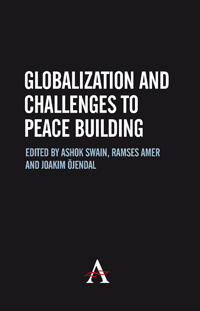 As a follow-up to this 2006 Annual conference, the steering committee of the Network decided to publish the papers presented in a volume edited by Ashok Swain, Ramses Amer and Joakim Öjendal. The book was finally published in December 2007, with the title ”Globalization and Challenges to Building Peace” (Anthem Press, London). More information.
As a follow-up to this 2006 Annual conference, the steering committee of the Network decided to publish the papers presented in a volume edited by Ashok Swain, Ramses Amer and Joakim Öjendal. The book was finally published in December 2007, with the title ”Globalization and Challenges to Building Peace” (Anthem Press, London). More information.
In
May 2007, a conference on ”Diasporas and their involvement in peace processes” was held and in October 2007, a conference on ”The Democratization Project: Challenges and Opportunities” (from which an edited volume of conference papers will be published in 2008, more information).
In September 2007, the Peace Network also
organised a seminar titled ”The Legacy of M.K. Gandhi in India and the World”, in collaboration with the Dag Hammarskjöld Foundation. The seminar highlighted Mahatma
Gandhi’s concepts of nonviolent resistance and anti-colonialism that have changed the world after World War II. Click here to download the invitation poster.
The Peace Network
is also involved in building up a Working Papers series, titled ”Working Papers in Peace, Conflict and Development Research”. It will be available freely from the website and will be advertised through the Peace Network Newsletter, the website and at Network events. The Series Editor is Ramses Amer. Go to the Working Papers website.
Prof. Ashok
Swain, Uppsala University, is the coordinator of the Peace Network. More
information on the network’s web page .
• GADNET organises Dreamcatcher conference in Lund
GADNET (Gender and Development Network) is another
Sida/SAREC funded multidisciplinary national network of Swedish
researchers and doctorate students. The network, with
specific research interests in gender and development, was formed
in April 2004 and is institutionally based at the Centre
for Global Gender Studies (CGGS) at Göteborg University.
The network is funded by Sida/SAREC for the period 2004-09. GADNET organises activities such as seminars and conferences
all over Sweden, via key contact persons (called nodes) at different
universities and university colleges. They form
sub-divisions of the national network. GADNET regularly arranges
so-called DreamCatcher workshops. In March 2008, GADNET will organise a Dreamcatcher conference at Lund University. It is titled "Gender, Religion and Development". More
information on GADNET.
• Heidelberg Cluster of Excellence on Asia and Europe in a Global Context
 In October 2007, the University of Heidelberg established a new so-called Cluster of Excellence titled "Asia and Europe in a Global Context: Shifting Asymmetries in Cultural Flows". It is part of the Excellence Initiative of the German Research Foundation (DFG), and has an institutional platform in Heidelberg, the Karl Jaspers Centre for Advanced Transcultural Research, with branch offices in India and China that will serve as the central places for working, meetings and administration. The objective of the Cluster is to examine processes of cultural exchange with a strong focus on interdisciplinary research. Research will be carried out within four specific themes: • Governance and Administration; • Public Spheres; • Health and Environment; and • Historicities and Heritage. A network of partner institutions, most of them in Asia and the United States, will foster the educational exchange and ensure the Cluster's international reputation within the scientific community. The partners in South Asia are the Centre for the Study of Developing Societies (CSDS), and the Indira Gandhi National Centre for Arts, both institutions in New Delhi. Until 31 March 2008, Prof. Dr. Axel Michaels from the Dept. of Classical Indology at the South Asia Institute in
Heidelberg is the
Acting Director for the Cluster.
In October 2007, the University of Heidelberg established a new so-called Cluster of Excellence titled "Asia and Europe in a Global Context: Shifting Asymmetries in Cultural Flows". It is part of the Excellence Initiative of the German Research Foundation (DFG), and has an institutional platform in Heidelberg, the Karl Jaspers Centre for Advanced Transcultural Research, with branch offices in India and China that will serve as the central places for working, meetings and administration. The objective of the Cluster is to examine processes of cultural exchange with a strong focus on interdisciplinary research. Research will be carried out within four specific themes: • Governance and Administration; • Public Spheres; • Health and Environment; and • Historicities and Heritage. A network of partner institutions, most of them in Asia and the United States, will foster the educational exchange and ensure the Cluster's international reputation within the scientific community. The partners in South Asia are the Centre for the Study of Developing Societies (CSDS), and the Indira Gandhi National Centre for Arts, both institutions in New Delhi. Until 31 March 2008, Prof. Dr. Axel Michaels from the Dept. of Classical Indology at the South Asia Institute in
Heidelberg is the
Acting Director for the Cluster.
• Graduate scholarships offered by the Heidelberg cluster of excellence
 The Graduate School connected to University of Heidelberg’s Cluster of Excellence ”Asia and Europe
in a Global Context. Shifting Asymmetries in Cultural Flows” (see above) offers 16 full graduate scholarships
for 2008. Each scholarship ranges from
1000 to 1400 Euro per month, and
are available to both home/EU and overseas students up to age thirty. Eight
scholarships are reserved for students from Asia. Applicants are required to have graduated
by the time of their application at a Master level or its equivalents.
Students
are required to actively participate in the studies programme of the
Graduate School. Applications will be evaluated on the basis
of academic qualifications, a research
proposal related to one of the Cluster’s research areas, letters of
reference,
and other professional experience. Deadline for applications is Thursday 1 May 2008.
The Graduate School connected to University of Heidelberg’s Cluster of Excellence ”Asia and Europe
in a Global Context. Shifting Asymmetries in Cultural Flows” (see above) offers 16 full graduate scholarships
for 2008. Each scholarship ranges from
1000 to 1400 Euro per month, and
are available to both home/EU and overseas students up to age thirty. Eight
scholarships are reserved for students from Asia. Applicants are required to have graduated
by the time of their application at a Master level or its equivalents.
Students
are required to actively participate in the studies programme of the
Graduate School. Applications will be evaluated on the basis
of academic qualifications, a research
proposal related to one of the Cluster’s research areas, letters of
reference,
and other professional experience. Deadline for applications is Thursday 1 May 2008.
• Associate Professor to teach Hinduism and Buddhism wanted in Trondheim
The Department of Archaeology and Religious Studies at the Norwegian University of Science and Technology in Trondheim, Norway, invites applications for a tenured position in Religious Studies at the Associate Professor level. Applicants must document good competence for research in one or several areas within the History of Religions, general competence in teaching the subject at several levels with regard to both religions and the methods of the discipline, and be able to contribute to developing courses for the whole discipline. The department particularly needs to cover teaching and academic supervision in Hinduism and Buddhism. The application deadline is 25 March 2008.
• Oxford University announces Readership in
Modern South Asian History
A Readership in
Modern South Asian History is announced at the
Faculty Of History, University of Oxford, with effect from October 2008 (or as soon as possible thereafter). A Fellowship at St Antony's College is attached to the readership. The successful candidate will have an outstanding research and publications record in Modern South Asian History, with an international reputation; outstanding current and projected research in South Asian History; and a record of successful graduate teaching and supervision, and experience of graduate taught courses. Applications from scholars with research interests in any period from 1700 are welcome, but the person appointed would be expected to cooperate in the teaching of the undergraduate courses on the 19th and 20th centuries. Closing date for applications is Friday 29 February 2008.
• Oxford University announces Lecturership in the Politics/International Relations of South Asia
The School of Interdisciplinary Area Studies and the Department of Politics and International Relations, University of Oxford, UK, seek applications for a full-time University Lecturership in the Politics/International Relations of South Asia. The Lecturership is tenable from 1 September 2008 or as soon as possible thereafter and will be held in conjunction with a Fellowship at Wolfson College. The post-holder will have office facilities in the School of Interdisciplinary Area Studies. Closing date for applications is 4 March 2008.
• Lecturership announced for Contemporary South Asia Studies Programme
The University of Oxford announces a Departmental Lecturership in Modern Indian Studies for the Contemporary South Asia Studies Programme in the School of Interdisciplinary Area Studies. Applications are invited from candidates in Sociology, Development Studies, Anthropology or other relevant
disciplines with special reference to India. The Lecturership is tenable from 1 September 2008 until 30 September 2011.
The lecturer will assist in teaching, supervision and marking on the MSc in Contemporary India, and develop and publish his/her research. Deadline for applications: Wednesday 9 April 2008. More information.
• More information about South Asia related
research at Swedish and Nordic universities
See SASNET’s page, http://www.sasnet.lu.se/research.html
• Useful information from the Pakistani Student Association in Sweden
 The Pakistani Student Association (PSA) in Sweden (Pakistanska Studentkåren i Sverige) is a federation of fully autonomous, self-functioning associations in different cities of Sweden. Currently (February 2008) there are the following PSAs, each with their own website:
• Chalmers Islamiska Föreningen; •
PSA Blekinge (BTH); •
PSA Halmstad; •
PSA Linköping; •
PSA Lund; and
PSA Stockholm. Besides, Pakistani students at Karlstad University and Umeå University co-ordinate their activities through mailing lists.
The aim of PSA is to facilitate Pakistani students coming to universities in Sweden by providing practical information to the students and collaborating with relevant authorities; to play a role in promoting the culture of Pakistan and clearing misconceptions about it, by inviting people from other countries to its cultural events; and to promote awareness amongst the Pakistani students about the Swedish society by arranging information sessions.
The PSA web site
offers valuable general information about how to apply for courses at Swedish universities (including warnings against so-called consultants); detailed information about the visa application process and requirements for non-European students to obtain a Swedish/Schengen visa; information about job opportunities in Sweden, etc.
The Pakistani Student Association (PSA) in Sweden (Pakistanska Studentkåren i Sverige) is a federation of fully autonomous, self-functioning associations in different cities of Sweden. Currently (February 2008) there are the following PSAs, each with their own website:
• Chalmers Islamiska Föreningen; •
PSA Blekinge (BTH); •
PSA Halmstad; •
PSA Linköping; •
PSA Lund; and
PSA Stockholm. Besides, Pakistani students at Karlstad University and Umeå University co-ordinate their activities through mailing lists.
The aim of PSA is to facilitate Pakistani students coming to universities in Sweden by providing practical information to the students and collaborating with relevant authorities; to play a role in promoting the culture of Pakistan and clearing misconceptions about it, by inviting people from other countries to its cultural events; and to promote awareness amongst the Pakistani students about the Swedish society by arranging information sessions.
The PSA web site
offers valuable general information about how to apply for courses at Swedish universities (including warnings against so-called consultants); detailed information about the visa application process and requirements for non-European students to obtain a Swedish/Schengen visa; information about job opportunities in Sweden, etc.
• Heidelberg offers summer school in Spoken Sanskrit
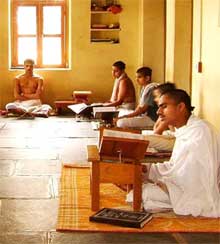 For the ninth year in a row,
the Dept. of Classical Indology at the South Asia Institute,
Heidelberg, Germany organises a Summer School in Spoken Sanskrit,
4 – 29 August 2008. Since its start back in the year
2000 it has attracted students and lecturers of Indological,
Religious and South Asian Studies from all over the world to
practice Sanskrit in a different way: Under the guidance of
Dr. Sadanada Das, a Sanskrit native speaker from Benares, all
those with a basic knowledge of Sanskrit grammar and vocabulary
shall learn to carefully listen, to accurately pronounce and
to slowly speak and recite this beautiful language. The four-week
intensive course helps strengthening the skills, making the
study of Sanskrit a lively and creative experience. Prerequisites:
elementary Sanskrit and English. Deadline for applications
is 30 April 2008.
For the ninth year in a row,
the Dept. of Classical Indology at the South Asia Institute,
Heidelberg, Germany organises a Summer School in Spoken Sanskrit,
4 – 29 August 2008. Since its start back in the year
2000 it has attracted students and lecturers of Indological,
Religious and South Asian Studies from all over the world to
practice Sanskrit in a different way: Under the guidance of
Dr. Sadanada Das, a Sanskrit native speaker from Benares, all
those with a basic knowledge of Sanskrit grammar and vocabulary
shall learn to carefully listen, to accurately pronounce and
to slowly speak and recite this beautiful language. The four-week
intensive course helps strengthening the skills, making the
study of Sanskrit a lively and creative experience. Prerequisites:
elementary Sanskrit and English. Deadline for applications
is 30 April 2008.
• Intensive Course in Nepali to be held in Heidelberg in August
In August 2008, the South Asia Institute at the University of
Heidelberg also organises an Intensive Course in Nepali. The experienced teacher Laxmi Nath Shrestha from Kathmandu has taught Nepali to generations of both students and researchers and has proven that he can make people start
speaking Nepali in short time. Starting from the first day, this course will be held in Nepali only. The course runs during the period 4–29 August. Deadline for applications
is 30 April 2008.
• Time to apply for the 2008 Summer Program in Punjab Studies
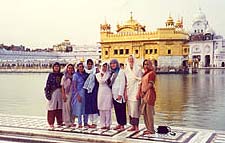 The
12th Summer Program in Punjab Studies will be held in
Chandigarh, India, 6 July – 16 August 2008. The program,
open to both graduate and undergraduate students, provides
six weeks of instruction in Punjab Studies. The work includes
the learning of Punjabi (50 hours), and history and culture
of the region (90 hours). The goal of the program is to impart
substantial academic information about the history and culture
of the region and provide an environment for discussion and
exploration. Deadline for applications is 3 March 2008. More
information.
The
12th Summer Program in Punjab Studies will be held in
Chandigarh, India, 6 July – 16 August 2008. The program,
open to both graduate and undergraduate students, provides
six weeks of instruction in Punjab Studies. The work includes
the learning of Punjabi (50 hours), and history and culture
of the region (90 hours). The goal of the program is to impart
substantial academic information about the history and culture
of the region and provide an environment for discussion and
exploration. Deadline for applications is 3 March 2008. More
information.
• Hamburg Summer School on Buddhism into the 21st Century
The Center for Buddhist Studies at the University of Hamburg invites to a week-long International Summer School on ”Buddhism into the 21st Century” to be held 28 July – 1 August 2008. It is explicitly designed for
students from all areas of study without any prior expertise in
Buddhist Studies. Apart from introducing approaches to the study of
Buddhism, it offers topics from religion and politics in Tibet,
Buddhist art, neuropsychological perspectives and creativity. More information.
•
Overseas Development Group 2008 courses for development
professionals
 The Overseas Development Group (ODG), a charitable company
wholly owned by the University of East Anglia, Norwich,
UK, regularly organizes short courses for development
professionals, some of them during the Spring–Summer 2008,
on subjects like ”Climate Change and Development” (1–12 September); ”Monitoring and Evaluating for Development Activities” (11 August – 5 September); and ”Practical Facilitation Skills for
Development Professionals and Practitioners” (30 June – 11 July). More
information about the ODG professional courses 2008.
The Overseas Development Group (ODG), a charitable company
wholly owned by the University of East Anglia, Norwich,
UK, regularly organizes short courses for development
professionals, some of them during the Spring–Summer 2008,
on subjects like ”Climate Change and Development” (1–12 September); ”Monitoring and Evaluating for Development Activities” (11 August – 5 September); and ”Practical Facilitation Skills for
Development Professionals and Practitioners” (30 June – 11 July). More
information about the ODG professional courses 2008.
• Kolkata course on Forced
Migration again to be held in December
The Annual Winter Courses on Forced
Migration are held each year in Kolkata, India from 1 December to 15 December. The short-term winter courses, organised by the Mahanirban Calcutta Research Group, are preceded
by a two and a half month long programme of distance education.
The course is intended for younger academics, refugee activists
and others working in the field of human rights and humanitarian
assistance for victims of forced displacement. The curriculum
deals with themes of nationalism, ethnicity, partition,
and partition-refugees, national regimes and the international
regime of protection, political issues relating to regional
trends in migration in South Asia, internal displacement, the
gendered nature of forced migration and protection framework,
resource politics, environmental degradation, and several other
issues related to the forced displacement of people.
Deadline for applications for the coming course is 31 May 2008. More
information.
• Classical Tamil Winter Seminar
2008 currently held in Pondicherry
The Classical Tamil Winter Seminar
2008, organised by the centre of the École Française d’Extrême-Orient (EFEO) in Pondicherry, is held during the period
11 February – 7th March 2008. The study of Classical Tamil is not widespread or prominent in the West. The EFEO Centre can offer the opportunity of approaching the difficult material by reading and discussing texts and commentaries both with Indian and Western scholars. This course contributes to the training of future generations of scholars, being centrally placed at the meeting point between continuity and renewal in Tamil studies.
• Heidelberg Summer school on Moving Images & Media Rituals
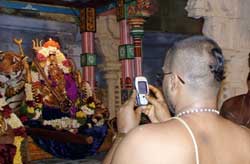 The Ritual and Media Working Group at the University of Heidelberg (SFB 619) organises a Summer School titled ”Moving Images & Media Rituals”, 28 July – 8 August 2008. Participants are invited to engage with a variety of experts in the analysis of film, video and hypermedia. Participants will explore questions about the making and the representation of rituals in and through media technologies with film and video makers. International teachers will engage students in interdisciplinary learning of theories and practical methods for handling ritual and media. The Summer School particularly addresses students and scholars from the fields of Religious Studies, Cultural and Media Studies or Cultural Anthropology. The SFB 619 Summer School will consist of two sections:
Section I Moving Images, and Section II Virtual Worlds. More information.
The Ritual and Media Working Group at the University of Heidelberg (SFB 619) organises a Summer School titled ”Moving Images & Media Rituals”, 28 July – 8 August 2008. Participants are invited to engage with a variety of experts in the analysis of film, video and hypermedia. Participants will explore questions about the making and the representation of rituals in and through media technologies with film and video makers. International teachers will engage students in interdisciplinary learning of theories and practical methods for handling ritual and media. The Summer School particularly addresses students and scholars from the fields of Religious Studies, Cultural and Media Studies or Cultural Anthropology. The SFB 619 Summer School will consist of two sections:
Section I Moving Images, and Section II Virtual Worlds. More information.
• European students now compete for the Saraswati Sanskrit Prize
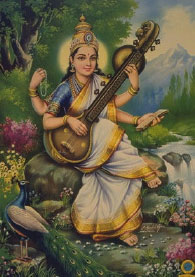 In collaboration with the Indian Council for Cultural Relations (ICCR) and the
Government of India, the Dept. of Classical Indology at the South Asia Institute,
Heidelberg University, has set up the Saraswati Sanskrit Prize for bonafide students
affiliated to a European University in any discipline dealing with Indian studies in its
broadest sense.
The award covers writings or oral presentations (including debates), in Sanskrit on
literary, cultural, political or economic aspects with specific emphasis on modern
issues.
For oral presentations, applications should include the topic and a brief summary and
should be submitted by July 14th, 2008. Oral presentations or debates will be held at
the South Asia Institute in Heidelberg between August 25th and 29th, 2008.
Written presentations should be submitted by August 31st, 2008. A short CV of the
applicant should be sent along with all the applications.
The winner of the prize will receive a ten-day trip to India, including a return flight
from Germany to New Delhi and accommodation in India sponsored by the ICCR and
the Government of India. A reception in honour of the winner will be held during which
(s)he will receive a metal plaque confirming that (s)he has been bestowed the prize.
In collaboration with the Indian Council for Cultural Relations (ICCR) and the
Government of India, the Dept. of Classical Indology at the South Asia Institute,
Heidelberg University, has set up the Saraswati Sanskrit Prize for bonafide students
affiliated to a European University in any discipline dealing with Indian studies in its
broadest sense.
The award covers writings or oral presentations (including debates), in Sanskrit on
literary, cultural, political or economic aspects with specific emphasis on modern
issues.
For oral presentations, applications should include the topic and a brief summary and
should be submitted by July 14th, 2008. Oral presentations or debates will be held at
the South Asia Institute in Heidelberg between August 25th and 29th, 2008.
Written presentations should be submitted by August 31st, 2008. A short CV of the
applicant should be sent along with all the applications.
The winner of the prize will receive a ten-day trip to India, including a return flight
from Germany to New Delhi and accommodation in India sponsored by the ICCR and
the Government of India. A reception in honour of the winner will be held during which
(s)he will receive a metal plaque confirming that (s)he has been bestowed the prize.
•
Lund University offers Sida-funded
educational training programmes
 Lund University Education – the university's company for
commissioned education – offers a number of English-language
educational training programmes funded by the Swedish International
Development Cooperation Agency, Sida, to be held in
the Fall 2008 – Spring 2009.
Lund University Education – the university's company for
commissioned education – offers a number of English-language
educational training programmes funded by the Swedish International
Development Cooperation Agency, Sida, to be held in
the Fall 2008 – Spring 2009.
–
The advanced International training programme on ”Sustainable
Urban Water and Sanitation” will run again with a 19 days course in Lund in October 2008, and with a regional seminar in one of the participating countries in April 2009. The overall objective
of the programme is to provide the participants with understanding
and knowledge about the need for integrated approaches and the
organisational and institutional changes that are necessary for
a sustainable provision of water supply and sanitation services
in urban areas. From
South Asia, professionals in the field from Bangladesh, India
and Sri Lanka are welcome to apply for this programme. The programme
is managed by staff from the Dept. of
Water Resources Engineering. Closing date for applications:
30 April 2008. More
information.
–
A training programme on ”Urban Transport”
for professionals in the field. From South Asia, persons from Bangladesh,
Bhutan, India, Nepal and Sri Lanka are welcome to apply for this
programme. Closing date for applications: 1 April 2008. More
information.
–
A training programme on ”Road Traffic Safety” runs
during the Spring and Fall 2008. The overall objective of the programme is to provide the participants with understanding and knowl
edge of what organisational and
institutional conditions are necessary
for the management of an efficient
and effective traffic safety work at a
national level.traffic safety problems, carry out
traffic safety investigations, compose
traffic safety schemes and evaluate
their effects. From South Asia, persons from
Bangladesh, Bhutan, Nepal and Sri Lanka have been accepted
for this programme. It
is managed by staff from the Department of Technology and Society, Lund University. Closing
date for applications was 26 November 2007. More
information.
– A training programme on ”Child
rights, Classroom and School Management”. It
consists of two phases: The first phase consists of 3 weeks
in Sweden with
studies in the subject area. This should be combined with a project
work on a part-time basis during 5 months on a relevant task in
the home country. The second phase consists of a follow-up seminar
of the project work during 2 weeks in India, during this phase
the participants will be asked as a part of the course to develop,
discuss and present plans for applying the course content in their
work. Finally, a couple of months after the second phase, a follow-up
visit will be conducted by the mentor to the participants’ home
countries. From South Asia, persons working with pedagogical support
and pedagogical development in Afghanistan, Bangladesh, Bhutan,
India, and Sri Lanka have been accepted
for this programme. Closing
date for applications was 11 January 2008. More
information.
–
A training programme on ”Sexual and
Reproductive Health and Rights – SRHR” runs
during the Spring and Fall 2008. The target group is persons working
with SRHR, in managing position and that have responsibility to
develop capacity and knowledge within SRHR. Participants should
have a background as midwives/teachers in the health care sector
or gynaecologists/obstetricians. From South Asia, persons from
Bangladesh, Bhutan, India, Nepal and Sri Lanka have been accepted
for this programme. The programme
is managed by staff from the Division
of Social Medicine and Global Health, Department of Health
Sciences, Lund University (in Malmö). Deadline for applications: 1 October every year. More
information.
• Folk high school in Jämtland offers development studies course focusing on India
Hållands Folkhögskola in Åre, Jämtland (mid-Sweden) organises a one year Development studies course (”U-landslinjen”) every year, starting in August. The course includes a two months stay in either India or Tanzania during the Spring semester. The subjects taught include Missionary research, Hindi (or Swahili), Development studies, and Cultural understanding. Deadline for applications to the 2008/09 course is 30 April 2008. More
information.
• More information about South Asia related
education at Swedish and Nordic universities
See SASNET’s page, http://www.sasnet.lu.se/education.html
• Allahabad conference on Intensive Village Studies
An International Seminar on ”Intensive Village Studies to the Understanding of the Rural Scenario in India” is held in Allahabad, India, 29 February – 1 March 2008. The seminar is organised by the Govind Ballabh Pant Social Science Institute in Jhusi. Intensive Village Studies involve personal participation of the principal investigator in the research' task through observations beyond the set of questionnaires and schedules, location of significant events that need understanding of the actors on the scene and efforts at learning both the views of the villagers and the investigator's own, and a paper based on such experiences with a personal touch would provide significant input to a seminar at the International level. More information.
• 10th Jaina Studies Workshop to be held at SOAS in London
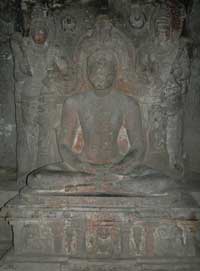 The 10th Jaina Studies Workshop will be held at the School of Oriental and African Studies (SOAS) in London, UK, 6–7 March 2008. The theme for the 2008 workshop will be ”Jaina Art & Architecture”. The Annual Jain Lecture will be presented by Maruti Nandan P. Tiwari from Banaras Hindu University (BHU), Varanasi, India. He will speak about ”New Approach to the Study of Jaina Art and Architecture”. The conference is co-organised and co-sponsored by the Centre of Jaina
Studies at SOAS (Dr. Peter Flügel), the Centre for Theology and Religious Studies at the
University of Lund (Prof. Olle Qvarnström) and the Victoria and Albert Museum in London (Dr. Nicholas Barnard) . Venue: Brunei Gallery Lecture Theatre, SOAS, Russell Square, London. More information.
The 10th Jaina Studies Workshop will be held at the School of Oriental and African Studies (SOAS) in London, UK, 6–7 March 2008. The theme for the 2008 workshop will be ”Jaina Art & Architecture”. The Annual Jain Lecture will be presented by Maruti Nandan P. Tiwari from Banaras Hindu University (BHU), Varanasi, India. He will speak about ”New Approach to the Study of Jaina Art and Architecture”. The conference is co-organised and co-sponsored by the Centre of Jaina
Studies at SOAS (Dr. Peter Flügel), the Centre for Theology and Religious Studies at the
University of Lund (Prof. Olle Qvarnström) and the Victoria and Albert Museum in London (Dr. Nicholas Barnard) . Venue: Brunei Gallery Lecture Theatre, SOAS, Russell Square, London. More information.
• Karachi conference on Status of Educational Reform in Developing Countries
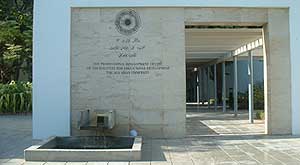 An International Conference on ”Status of Educational Reform in Developing Countries” will be held in Karachi, Pakistan, 8–10
April 2008. The conference, organised by the Aga Khan University Institute for Educational Development (AKU-IED), aims at providing a forum for dissemination of educational research on quality of educational reform, its impact and related issues; and to promote networking and enable contact among the various stakeholders engaged in educational research. Keynote speakers for the conference are Prof. Krishna Kumar,
Director for the
National Council of Educational Research and Training (NCERT),
New Delhi, India; Dr Munawar S. Mirza,
Vice Chancellor,
Institute of Education and Research, University of the Punjab, Lahore; and David Stephens, Professor of International Education,
University of Brighton, UK. Venue: AKU-IED, 1-5 Block 7, Federal B. Area, Karimabad, Karachi. More information.
An International Conference on ”Status of Educational Reform in Developing Countries” will be held in Karachi, Pakistan, 8–10
April 2008. The conference, organised by the Aga Khan University Institute for Educational Development (AKU-IED), aims at providing a forum for dissemination of educational research on quality of educational reform, its impact and related issues; and to promote networking and enable contact among the various stakeholders engaged in educational research. Keynote speakers for the conference are Prof. Krishna Kumar,
Director for the
National Council of Educational Research and Training (NCERT),
New Delhi, India; Dr Munawar S. Mirza,
Vice Chancellor,
Institute of Education and Research, University of the Punjab, Lahore; and David Stephens, Professor of International Education,
University of Brighton, UK. Venue: AKU-IED, 1-5 Block 7, Federal B. Area, Karimabad, Karachi. More information.
• 3rd annual Nordic workshop on Peace and Development in Sri Lanka to be held in Oslo
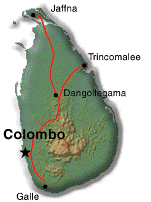 The 3rd annual Nordic workshop on Peace and Development in Sri Lanka will
be held at the Museum of Cultural History, University of Oslo, 24–25
April 2008. The programme will be organised in three thematic sessions, reflecting
contemporary processes and concerns in Sri Lanka as well as the main
research foci of Nordic Sri Lanka scholars. Each session will include a
keynote lecture by an invited Sri Lankan scholar and paper presentations
by other participants. The workshop themes, invited speakers and
organisers are: • Theme I: Livelihoods in the context of armed conflict and peace negotiations: keynote speaker: Dr. Darini Rajasingham Senanayake, Social Scientists'
Association, Colombo; session organiser: N. Shanmugaratnam. • Theme II: Political dynamics and transformations during the peace process
and after: keynote speaker: Professor Jayadeva Uyangoda, Department of Political
Science and Public Policy, University of Colombo; session organiser: Kristian Stokke. • Theme III: Transnationalism and transformation of 'home'; keynote speaker: Assistant Professor R. Cheran, Department of Sociology
and Anthropology, University of Windsor, Canada;
session organiser: Øivind Fuglerud. More information.
The 3rd annual Nordic workshop on Peace and Development in Sri Lanka will
be held at the Museum of Cultural History, University of Oslo, 24–25
April 2008. The programme will be organised in three thematic sessions, reflecting
contemporary processes and concerns in Sri Lanka as well as the main
research foci of Nordic Sri Lanka scholars. Each session will include a
keynote lecture by an invited Sri Lankan scholar and paper presentations
by other participants. The workshop themes, invited speakers and
organisers are: • Theme I: Livelihoods in the context of armed conflict and peace negotiations: keynote speaker: Dr. Darini Rajasingham Senanayake, Social Scientists'
Association, Colombo; session organiser: N. Shanmugaratnam. • Theme II: Political dynamics and transformations during the peace process
and after: keynote speaker: Professor Jayadeva Uyangoda, Department of Political
Science and Public Policy, University of Colombo; session organiser: Kristian Stokke. • Theme III: Transnationalism and transformation of 'home'; keynote speaker: Assistant Professor R. Cheran, Department of Sociology
and Anthropology, University of Windsor, Canada;
session organiser: Øivind Fuglerud. More information.
• Helsinki conference on Development Research
A conference on Development Research titled ”Development, Justice, Governance: New Challenges in the Global South” will be held at the University of Helsinki, Finland, 24–25 April 2008. The conference will gather together researchers, students, civil society actors and other stakeholders interested in discussing recent research conducted in this multi-disciplinary field. It is organized by the Finnish Society for Development Research in cooperation with the Institute of Development Studies (University of Helsinki), the European Association for Development Research (EADI), Universities’ Partnership for International Development (UniPID), and Helsinki University Environmental Research Centre (HERC). The invited keynote speakers include
Dr. Stephanie Barrientos, IDPM, University of Manchester, UK, who will give a presentation about ”Ethical Trade: why are corporate codes failing vulnerable workers?”; and
Prof. David Demeritt, King’s College, University of London, UK, who will give a presentation about ”PEST or Panacea? Science, Democracy, and the Promise of Public Participation”. Deadline for registration is 14 March 2008. More information.
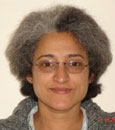 • Uppsala PhD course on Gender, Rural Development and Natural Resource Management
• Uppsala PhD course on Gender, Rural Development and Natural Resource Management
A multidisciplinary PhD course on ”Gender, Rural Development and Natural Resource Management” will be held in Uppsala 28 April – 16 May 2008. The 4,5 ECTS credits course is provided by the Unit for Rural Development, Department for Urban and
Rural Studies, Swedish University of Agricultural Sciences (SLU). It will focus on the role that gender equality and
democracy have in the attainment of sustainable development. What pressures do violent conflicts and
epidemics put on resource use and how does that impact on gender
relations? What insights do we gain from feminist postcolonial readings of
development and natural resource management? The teachers include the SLU researchers Seema Arora-Jonsson and Adam Pain. Dr. Nitya Rao (photo to the right) from the University of East Anglia, UK, will also take part in the course, and teach about ”Land and gender: Key debates”. Applications (in English) should be mailed to course coordinator Seema
Arora-Jonsson and copied to Elinor
Carlbrand. Deadline for applications is Monday 14 April 2008. More information.
• Second International Sanskrit Computational Linguistics Symposium in Providence
The Second International Sanskrit Computational Linguistics Symposium
and
Sanskrit Library Workshop will be held in Providence, Rhode Island, USA , 15–17 May 2008.
The International Digital Sanskrit Library Integration project (IDSLI) at Brown University will host the symposium/workshop to be held at Brown University in Providence. The Symposium follows upon the successful First International Sanskrit Computational Linguistics Symposium 29-31 October 2007 hosted by Gerard Huet at INRIA, Rocquencourt near Paris and the formation of the International Sanskrit Computational Linguistics Consortium.
• Gender, Sexuality, and Global Change theme for the GEXcel workshop conference in Örebro
The Centre of Gender Excellence (GEXcel), Institute of Thematic Gender Studies, run jointly by Linköping University and Örebro University, invites to a workshop conference in Örebro 22–22 May 2008. The workshop deals with GEXcel's current Theme ”Gender, Sexuality, and Global Change”, and applications are especially welcome from junior and senior scholars whose research directly addresses one of the following three sub-themes: 1) Sexuality, Love and Social Theory; 2) Power and Politics: A Feminist View; and 3) Common and Conflicted: Rethinking Interest, Solidarity, and Action.” More information.
• Gujarat Studies Association conference in Toronto
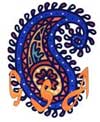 The
Gujarat Studies Association will be holding its 2nd Biennial
Conference on 23-24 May 2008 at the University of Toronto, Canada.
The theme for the conference is "Identities:
Reflections on Global Gujarati Communities". It will
be organised in collaboration with the University of Toronto and
its New College, the Historical Studies Department at University
of Toronto Mississauga, the Centre for South Asian Studies, the
Religion in the Public Sphere Initiative and the Nirman Foundation.
Ali Asani, Kenya born Professor of the Practice of Indo-Muslim
Languages and Culture at Harvard University, USA, will be one of
the key speakers, along with Professor Radhika Desai from University
of Manitoba, Canada; and Professor Raymond B. Williams from Wabash College, Crawfordsville, Indiana, USA. More
information.
The
Gujarat Studies Association will be holding its 2nd Biennial
Conference on 23-24 May 2008 at the University of Toronto, Canada.
The theme for the conference is "Identities:
Reflections on Global Gujarati Communities". It will
be organised in collaboration with the University of Toronto and
its New College, the Historical Studies Department at University
of Toronto Mississauga, the Centre for South Asian Studies, the
Religion in the Public Sphere Initiative and the Nirman Foundation.
Ali Asani, Kenya born Professor of the Practice of Indo-Muslim
Languages and Culture at Harvard University, USA, will be one of
the key speakers, along with Professor Radhika Desai from University
of Manitoba, Canada; and Professor Raymond B. Williams from Wabash College, Crawfordsville, Indiana, USA. More
information.
• 40 panels to choose from at the
20th ECMSAS conference in Manchester
 The
20th European Conference on Modern South Asian Studies (ECMSAS)
will be held in Manchester, UK, 8–11 July 2008.
The ECMSAS is the largest gathering of South Asia oriented researchers
in Europe, covering all fields from the humanities and social sciences
to technology, natural sciences and medicine. The conference is
held biannually under the aegis of the European Association of
South Asian Studies (EASAS), a professional, non-profit organisation
of scholars engaged in research and teaching concerning South Asia
with regard to all periods and fields of study.
The 2008 conference
will be hosted by the School of Arts, Histories and Cultures at
the University of Manchester, and draws on the vibrant South Asian
Studies programmes in Humanities and Social Sciences at the University. Venue: Humanities Lime Grove building, University of Manchester Oxford Road Campus. Deadline for early-bird registration is 21 April 2008. Go to the conference
web site.
The
20th European Conference on Modern South Asian Studies (ECMSAS)
will be held in Manchester, UK, 8–11 July 2008.
The ECMSAS is the largest gathering of South Asia oriented researchers
in Europe, covering all fields from the humanities and social sciences
to technology, natural sciences and medicine. The conference is
held biannually under the aegis of the European Association of
South Asian Studies (EASAS), a professional, non-profit organisation
of scholars engaged in research and teaching concerning South Asia
with regard to all periods and fields of study.
The 2008 conference
will be hosted by the School of Arts, Histories and Cultures at
the University of Manchester, and draws on the vibrant South Asian
Studies programmes in Humanities and Social Sciences at the University. Venue: Humanities Lime Grove building, University of Manchester Oxford Road Campus. Deadline for early-bird registration is 21 April 2008. Go to the conference
web site.
40 panels have been accepted, covering a vast field of scientific areas, from ”Censorship, Subjectivity, and Subversion: Cultural Regulation in India from the
Colonial Era to the Present” to ”Vegetarianisms: the communicative power of meat in South Asia” and ”Routes and Roots of Democracy in the Himalayas”. Full information about the accepted panels.
SASNET organised
the 18th ECMSAS conference in Lund in 2004 (more
information about the Lund conference), and in June 2006, the
19th ECMSAS conference was arranged in Leiden, the Netherlands
(read SASNET’s report
from the Leiden conference).
• 25th Sanskrit Tradition in the Modern World meeting to be held in Manchester
The 25th annual meeting of the Sanskrit Tradition in the Modern World, STIMW, seminar will be organised in Machester, UK, on Friday 11 July 2008. Two years ago, STIMW moved to Manchester (previously the STIMW seminars were held at Minsteracres Retreat Centre, a monastery in the Tyne valley near to Newcastle), to continue to offer a forum for the discussion of papers on varied aspects of Indian religions. This year, STIMW celebrates 25 years by combining with the 20th European Conference on Modern South Asian Studies being held in the University of Manchester (see above). Paper proposals are particularly welcome from international scholars who would not normally be able to attend the one day event in the UK, but who will be attending the ECMSAS conference. More information.
• 14th Himalayan Languages Symposium to be held in Göteborg
The 14th Himalayan Languages Symposium (HLS) will be held in Göteborg, 21–23 August 2008. The Himalayan Languages Symposium brings together scholars working on languages and language communities of the greater Himalayan region: north-western and north-eastern India, Nepal, Bhutan and the Tibetan Plateau, northern Burma and Sichuan, and Nuristan, Baltistan and the Burushaski-speaking area in the west. Scott DeLancey from the University of Oregon, USA, will be the keynote speaker. The 14th HLS is organised by the Dept. of Linguistics, Göteborg University. Deadline for sending abstracts: 31 March 2008.
• Delhi conference on Marriage in Globalizing Contexts to be held in September
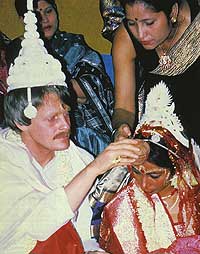 An International conference on ”Marriage in Globalizing Contexts: Exploring Change and Continuity in South Asia” will be held in New Delhi, India 25–26 September 2008. NOTE new dates! It is organised by Dr. Ravinder Kaur, Associate Professor, Department of Humanities and Social Sciences, Indian Institute of Technology, New Delhi, and Dr. Shalini Grover, Sir Ratan Tata Post Doctoral Fellow, Institute of Economic Growth (IEG), University of Delhi. Papers are invited on marriage and family research focusing on the countries of Afghanistan, Bangladesh, Bhutan, India, Maldives, Nepal, Pakistan and Sri Lanka. Individual contributions should combine conceptual thinking with ethnographic content (i.e. field-work, participant observation and interviews) and be based on the following themes: • Conceptual understandings of marriage; • Demographic Imbalances, Economic Shifts and Marriage Markets; • Shifting ideas of love, intimacy and marital practices; • Divorce and re-marriage; • Women’s paid work, labour force participation and marriage; or • Socio-legal advancements, feminist interventions and their impact on marriage/domestic life. The goal is to consolidate an edited volume that can lend differing perspectives to marriage in South Asia.
An International conference on ”Marriage in Globalizing Contexts: Exploring Change and Continuity in South Asia” will be held in New Delhi, India 25–26 September 2008. NOTE new dates! It is organised by Dr. Ravinder Kaur, Associate Professor, Department of Humanities and Social Sciences, Indian Institute of Technology, New Delhi, and Dr. Shalini Grover, Sir Ratan Tata Post Doctoral Fellow, Institute of Economic Growth (IEG), University of Delhi. Papers are invited on marriage and family research focusing on the countries of Afghanistan, Bangladesh, Bhutan, India, Maldives, Nepal, Pakistan and Sri Lanka. Individual contributions should combine conceptual thinking with ethnographic content (i.e. field-work, participant observation and interviews) and be based on the following themes: • Conceptual understandings of marriage; • Demographic Imbalances, Economic Shifts and Marriage Markets; • Shifting ideas of love, intimacy and marital practices; • Divorce and re-marriage; • Women’s paid work, labour force participation and marriage; or • Socio-legal advancements, feminist interventions and their impact on marriage/domestic life. The goal is to consolidate an edited volume that can lend differing perspectives to marriage in South Asia.
• Heidelberg conference on Ritual Dynamics and the Science of Ritual
A conference titled "Ritual Dynamics and the Science of Ritual" will be held in Heidelberg, Germany, 29 September –
2 October 2008. The aim of the conference, organised by the the Collaborative Research Centre "Ritual Dynamics" at the University of Heidelberg, is to develop collaborative models to research rituals at an international level. At present twentyone panels are being organised. The diversity of topics will reflect the diversity of backgrounds of the participants – from Anthropology to Musicology, Assyriology to Mediaeval Studies, Medical Psychology to Indology. Alongside such interests as creating theories with
interdisciplinary
trajectories, Asia
will also constitute a major regional focus of the conference.
The
range extends from Hindu monarchies of southern
India
from the early Middle Ages to the Colonial era, and from
historical
to contemporary China
and Japan. More information.
• Veena Das keynote speaker at the 37th Annual Madison Conference on South Asia
 The 37th Annual Madison Conference on South Asia will be held on October 16–19, 2008. The conference attracts over 500 scholars and specialists on South Asia and is a great venue for intellectual, professional, and social exchange. Veena Das, Professor of anthropology at the Johns Hopkins University, Baltimore, will deliver the keynote address "Violence and the Reinhabiting: Reinhabiting the Everyday." Panels, roundtables, and individual papers on all topics pertaining to South Asian studies are welcome. Registration and proposal submission forms (single papers, panels, roundtables, preconferences) are available on line. Deadline for submission is April 1, 2008. Venue: Madison Concourse Hotel, Madison, Wisconsin, USA. More information.
The 37th Annual Madison Conference on South Asia will be held on October 16–19, 2008. The conference attracts over 500 scholars and specialists on South Asia and is a great venue for intellectual, professional, and social exchange. Veena Das, Professor of anthropology at the Johns Hopkins University, Baltimore, will deliver the keynote address "Violence and the Reinhabiting: Reinhabiting the Everyday." Panels, roundtables, and individual papers on all topics pertaining to South Asian studies are welcome. Registration and proposal submission forms (single papers, panels, roundtables, preconferences) are available on line. Deadline for submission is April 1, 2008. Venue: Madison Concourse Hotel, Madison, Wisconsin, USA. More information.
• Swedish connection to 1st International Conference on Languages and Dialects in Iran
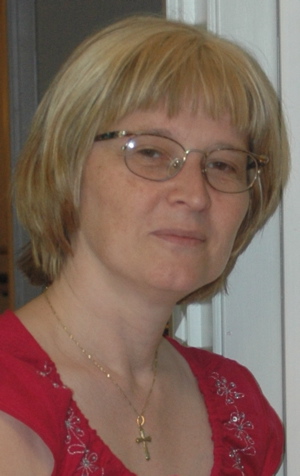 The 1st International Conference on Languages and Dialects in Iran will be held in Zahedan, Iran, 28–31 October 2008. The conference is jointly organised by the Dept. of English and Linguistics, University of Sistan and Baluchestan in Zahedan, and Iranian Languages, Dept. of Linguistics and Philology at Uppsala University. Prof. Carina Jahani (photo) is a member of the scientific committee preparing the conference, and Prof. Emeritus Bo Utas will be one of the plenary speakers. Iranian languages, such as Dari, Pashto and Balochi, are widely spoken in Afghanistan and Pakistan. The purpose of the conference is to stimulate linguistic research in Iran by creating a network of field linguists interested in the study of languages and dialects in Iran in their sociolinguistic milieu. More information.
The 1st International Conference on Languages and Dialects in Iran will be held in Zahedan, Iran, 28–31 October 2008. The conference is jointly organised by the Dept. of English and Linguistics, University of Sistan and Baluchestan in Zahedan, and Iranian Languages, Dept. of Linguistics and Philology at Uppsala University. Prof. Carina Jahani (photo) is a member of the scientific committee preparing the conference, and Prof. Emeritus Bo Utas will be one of the plenary speakers. Iranian languages, such as Dari, Pashto and Balochi, are widely spoken in Afghanistan and Pakistan. The purpose of the conference is to stimulate linguistic research in Iran by creating a network of field linguists interested in the study of languages and dialects in Iran in their sociolinguistic milieu. More information.
• South Asia in focus at the 2008 meeting of the American Academy of
Religion
 The regional focus of the 2008 meeting of the American Academy of
Religion (AAR) is South Asia. The conference is held in Chicago, Illinois, USANovember 1–3,
2008. It includes a separate section on Religion in South Asia (RISA), and groups focusing on issues like ”Comparative Studies in Hinduisms and Judaisms”; ”Hinduism”; ”Ritual Studies” (co-chaired by Prof. Ute Huesken, University of Oslo); ”Sacred Space in Asia”; ”Tantric Studies”; and ”Tibetan and Himalayan Religions”. AAR is the world's largest association of academics who research or teach topics related to religion. Registration for the meeting opens on
Monday 21 April, but the deadline for submitting paper proposals is already 25 February 2008. More information about the 2008 AAR meeting.
The regional focus of the 2008 meeting of the American Academy of
Religion (AAR) is South Asia. The conference is held in Chicago, Illinois, USANovember 1–3,
2008. It includes a separate section on Religion in South Asia (RISA), and groups focusing on issues like ”Comparative Studies in Hinduisms and Judaisms”; ”Hinduism”; ”Ritual Studies” (co-chaired by Prof. Ute Huesken, University of Oslo); ”Sacred Space in Asia”; ”Tantric Studies”; and ”Tibetan and Himalayan Religions”. AAR is the world's largest association of academics who research or teach topics related to religion. Registration for the meeting opens on
Monday 21 April, but the deadline for submitting paper proposals is already 25 February 2008. More information about the 2008 AAR meeting.
• Asian Creativity
in Culture and Technology theme for the NORASIA conference in Trondheim
The Norwegian Network for Asian Studies invites for its 5th biannual NORASIA conference, to be held in Trondheim 12–16 November 2008. The theme for the conference will be “Asian Creativity
in Culture and Technology”, and it will be open to Nordic and international scholars and
PhD students as well as other specialists with an interest in and
knowledge about Asian Creativity.
Furthermore, and in line with the traditions of the Norwegian
Asia Network and the NIAS SUPRA programme, Master students
are also invited to participate and submit academically qualified
papers, even outside the proposed themes of the conference. Associate Professor Smriti Srinivas from the Dept. of Anthropology, University of California,
Davis, USA, will be one of the keynote speakers. The suggested topic for her speech is ”Landscapes of Urban Memory: The Sacred and the Civic in
Bangalore, India’s High Tech City”. The event is organised in collaboration with the Nordic Institute of Asian Studies (NIAS), the Nordic NIAS Council (NNC), and the Norwegian University of Science and Technology (NTNU) in Trondheim (hosting the conference). More information
• First World Biodiversity Congress to be held in Chiang Mai
The First World Biodiversity Congress will be held in Chiang Mai, Thailand, 9–12 December 2008. The conference, organized by the Indian Century Foundation in Bangalore, and UNISERVE at Chiang Mai University,
will help to develop an agenda to ensure conservation of bioresources and ecosystem protection for sustainable development. It will bring together the international scientific community involved in the study of biological diversity and an unique opportunity to deepen our understanding of nature and natural resources. Deadline for abstracts/proposals:
30 September 2008. More information.
• Think Asia! theme for the ICAS6 to be held in Daejon, South Korea
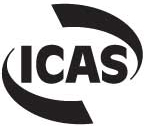 The 6th International Convention of Asia Scholars (ICAS6) will be held in Daejon, South Korea, 14–17 August 2009. It will be hosted by the Chungnam National University (CNU), the
Center for Asian Regional Studies (CARS) and Daejeon Metropolitan City. The
overarching theme will be ”Think Asia!”. More than 1,500 Asia Studies
specialists in the fields of the Human and Natural Sciences from all over the world are expected to participate. Submission of abstracts and panels is possible as of 15 March 2008 at
the ICAS website. For the third time the ICAS Book Prizes will also be awarded during the convention, in the categories: Humanities, Social Sciences, Best PhD and Colleagues’ Choice Award. Deadline for nominations is 31 August 2008. More information.
The 6th International Convention of Asia Scholars (ICAS6) will be held in Daejon, South Korea, 14–17 August 2009. It will be hosted by the Chungnam National University (CNU), the
Center for Asian Regional Studies (CARS) and Daejeon Metropolitan City. The
overarching theme will be ”Think Asia!”. More than 1,500 Asia Studies
specialists in the fields of the Human and Natural Sciences from all over the world are expected to participate. Submission of abstracts and panels is possible as of 15 March 2008 at
the ICAS website. For the third time the ICAS Book Prizes will also be awarded during the convention, in the categories: Humanities, Social Sciences, Best PhD and Colleagues’ Choice Award. Deadline for nominations is 31 August 2008. More information.
• 14th World Sanskrit Conference to be held in Kyoto
The 14th World Sanskrit Conference will be held in Kyoto, Japan
on 1–5 September 2009. It is hosted jointly by the International Association of Sanskrit Studies (IASS), and the Graduate School of Letters (Department of Indological Studies), Kyoto University. The conference will operate in 15 parallel sections (with five sessions
running concurrently) chaired by the conveners specializing in their respective fields. Scholars are invited to submit titles for papers. Abstracts must be submitted by the end of December 2008. Venue: Yoshida Campus of Kyoto University, Japan. More information.
• Other conferences connected to South Asian
studies arranged all over the World
See SASNET’s page, http://www.sasnet.lu.se/conferences.html#conf
Important lectures and seminars in Scandinavia
• Risk of Nuclear Catastrophe and
Implications for Asia theme for the CPAS Seminar 2008
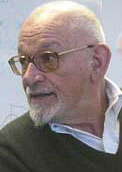 The CPAS Seminar 2008, organised by the Centre for Pacific Asian Studies at Stockholm University, in collaboration with the Swedish Pugwash Movement, will be held in Stockholm on Tuesday 4 March 2008, 14.00–16.00. Francesco Calogero (photo to the right),
Professor of Theoretical Physics at University of Rome I 'La Sapienza' (and former Secretary-General of the Pugwash Conferences on Science and World Affairs) will talk about ”The Risk of a Nuclear Catastrophe and
its Implications for Asia”. The discussant will be Ambassador Rolf Ekéus,
Chairman of the SIPRI Governing Board & the Swedish Pugwash. The background of the seminar is the fact that Asia has become an epicentre of nuclear proliferation such as the A.Q. Khan's Pakistani network and the North Korean nuclear problem. The seminar will first survey various kinds of nuclear catastrophes, from a major nuclear war to a serious accident in a civilian nuclear installation, and focus on one of these risks, the destruction of a city caused by the explosion of a nuclear device manufactured by a terrorist commando; its likelihood, and what to do to prevent it. It will then assess the risk of nuclear-weapon proliferation in the world, its implications for Asia, as well as recent prospects of significant progress towards the achievement of a nuclear-weapon-free world. Venue: CPAS, Kräftriket 4B, Stockholm University
(0.8 km south of Metro 'Universitet'/Stockholm University Frescati; 'Albano' by Bus 40 or 70). More information.
The CPAS Seminar 2008, organised by the Centre for Pacific Asian Studies at Stockholm University, in collaboration with the Swedish Pugwash Movement, will be held in Stockholm on Tuesday 4 March 2008, 14.00–16.00. Francesco Calogero (photo to the right),
Professor of Theoretical Physics at University of Rome I 'La Sapienza' (and former Secretary-General of the Pugwash Conferences on Science and World Affairs) will talk about ”The Risk of a Nuclear Catastrophe and
its Implications for Asia”. The discussant will be Ambassador Rolf Ekéus,
Chairman of the SIPRI Governing Board & the Swedish Pugwash. The background of the seminar is the fact that Asia has become an epicentre of nuclear proliferation such as the A.Q. Khan's Pakistani network and the North Korean nuclear problem. The seminar will first survey various kinds of nuclear catastrophes, from a major nuclear war to a serious accident in a civilian nuclear installation, and focus on one of these risks, the destruction of a city caused by the explosion of a nuclear device manufactured by a terrorist commando; its likelihood, and what to do to prevent it. It will then assess the risk of nuclear-weapon proliferation in the world, its implications for Asia, as well as recent prospects of significant progress towards the achievement of a nuclear-weapon-free world. Venue: CPAS, Kräftriket 4B, Stockholm University
(0.8 km south of Metro 'Universitet'/Stockholm University Frescati; 'Albano' by Bus 40 or 70). More information.
• Asoke Bhattacharya presents book on Grundtvig in Denmark
 The Centre for Grundtvig Studies at Aarhus University, Denmark, invites for a book launch seminar on Thursday 6 March, 15.00–18.00. Dr. Asoke Bhattacharya from Kolkata, India, will present his new book titled ”Education for
the People”, focusing on the work by the 19th Century Danish priest, poet and writer N F S Grundtvig, considered to be a pioneer within
the field of adult education. Dr. Bhattacharya from the Adult
and Continuing Education and Extension Centre at Jadavpur University in Kolkata, has spent the recent months as a visiting scholar in Aarhus. Venue: Auditorium 1, Faculty of Theology,
Aarhus University, Tåsingegade 3, Århus.
The Centre for Grundtvig Studies at Aarhus University, Denmark, invites for a book launch seminar on Thursday 6 March, 15.00–18.00. Dr. Asoke Bhattacharya from Kolkata, India, will present his new book titled ”Education for
the People”, focusing on the work by the 19th Century Danish priest, poet and writer N F S Grundtvig, considered to be a pioneer within
the field of adult education. Dr. Bhattacharya from the Adult
and Continuing Education and Extension Centre at Jadavpur University in Kolkata, has spent the recent months as a visiting scholar in Aarhus. Venue: Auditorium 1, Faculty of Theology,
Aarhus University, Tåsingegade 3, Århus.
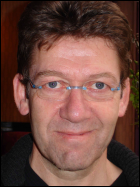 • Thomas Blom Hansen lectures at Uppsala seminar on the India that Does Not Shine
• Thomas Blom Hansen lectures at Uppsala seminar on the India that Does Not Shine
The South Asia Seminar at Uppsala University invites for a seminar with Dr. Thomas Blom Hansen,
Professor of Anthropology,
University of Amsterdam, who will speak about ”The India that Does Not Shine:
India’s Muslims and new economies of fear”, on Monday 17 March 2008, 14.15–16.00. Prof. Blom Hansen is an internationally acclaimed scholar with major work on religious and political violence in urban India. His main theoretical interests relate the anthropology of politics, the postcolonial state and sovereignty. More recently he has done research on religious revival and the everyday meanings of freedom and belonging in post-apartheid South Africa. His publications include ”The Saffron Wave. Democracy and Hindu nationalism in Modern India” (Princeton 1999); ”Wages of Violence. Naming and identity in postcolonial Bombay” (Princeton 2001), and two co-edited volumes with Finn Stepputat, ”States of Imagination. Ethnographic Explorations of the Postcolonial State” (Duke 2001) and ”Sovereign Bodies. Citizens, Migrants and States in the postcolonial world” (Princeton 2005). Venue:
Engelska Parken, room 2-0023. For further information, please contact Gunnel Cederlöf, Dept. of History, and Willy Pfändtner, Dept. of Theology.
• Bo Kage Carlson lectures on Pakistan after the elections
The Swedish journalist Bo Kage Carlson holds a CPAS lecture about ”Pakistan efter valet" (Pakistan after the elections) in Stockholm on Wednesday 26 March 2008, 15–17. It is part of lecture series that the Center for Pacific Asia Studies (CPAS) organises every week. Venue: Hall B, Dept. of Oriental Languages, Stockholm University, Kräftriket 4.
Business and Politics
• Proposals invited for European Business and Technology Centre in New Delhi
 The European Commission (EC) now invites proposals for the establishment of a European Business and Technology Centre (EBTC) in India. It should be located in New Delhi with a country wide coverage. Further centres may be
opened up in the future in other cities of India as the project develops. According to the Call for Proposals, the EC has made 6.6 million euro available, representing up to 80 per cent of the cost. The successful applicant will have to provide a minimum of 20 per cent of the cost for the proposed action.
The overall objective is to improve links between European and Indian businesses and with Science and Technology stakeholders involving business, industry and public bodies with a view to essentially promote the EU interests in India and tap the fast-growing Indian economy.
The Centre is expected to target the following sectors: Environment (such as Clean Development Mechanism, Chemicals Management, Water Management and Waste Management); Climate Change including mitigation and adaptation technologies; Transport; Energy (renewable energy, energy efficiency, clean coal, and carbon capture and storage technologies) and Biotech; sectors where the EU business operators experience non-tariff barriers and market access constraints.
The deadline for the submission of proposals is 30 May 2008. More detailed information, as well as the application forms, can be found at http://ec.europa.eu/europeaid/cgi/frame12.pl (Select Search Type – 'By Reference', enter Reference – 126732 and click on 'Submit Query')
The European Commission (EC) now invites proposals for the establishment of a European Business and Technology Centre (EBTC) in India. It should be located in New Delhi with a country wide coverage. Further centres may be
opened up in the future in other cities of India as the project develops. According to the Call for Proposals, the EC has made 6.6 million euro available, representing up to 80 per cent of the cost. The successful applicant will have to provide a minimum of 20 per cent of the cost for the proposed action.
The overall objective is to improve links between European and Indian businesses and with Science and Technology stakeholders involving business, industry and public bodies with a view to essentially promote the EU interests in India and tap the fast-growing Indian economy.
The Centre is expected to target the following sectors: Environment (such as Clean Development Mechanism, Chemicals Management, Water Management and Waste Management); Climate Change including mitigation and adaptation technologies; Transport; Energy (renewable energy, energy efficiency, clean coal, and carbon capture and storage technologies) and Biotech; sectors where the EU business operators experience non-tariff barriers and market access constraints.
The deadline for the submission of proposals is 30 May 2008. More detailed information, as well as the application forms, can be found at http://ec.europa.eu/europeaid/cgi/frame12.pl (Select Search Type – 'By Reference', enter Reference – 126732 and click on 'Submit Query')
• More information about South Asia related business and politics in Sweden
See SASNET's page, http://www.sasnet.lu.se/polbuss.html
South Asia related culture in Scandinavia
• Information about South Asia related culture
in Sweden and Scandinavia
See SASNET’s page, http://www.sasnet.lu.se/culture.html
New and updated items on SASNET web site
• Swedish departments where research on
South Asia is going on:
Constantly added to the list of research environments at Swedish
universities, presented by SASNET. The full list now includes 226 departments,
with detailed descriptions of the South Asia related research and education
taking place! Go to http://www.sasnet.lu.se/environment.html
ƒ Department of Emergency and Cardiovascular Medicine at Sahlgrenska Academy, Göteborg University
ƒ Centre of Gender Excellence (GEXcel), Institute of Thematic Gender Studies, Linköping University
(in collaboration with Örebro University)ƒ Department of Classical Archaeology and Ancient History, Lund University
ƒ Department of Comparative Literature, Centre for Languages and Literature (SOL), Lund University
ƒ Molecular Biology, Department of Cell & Molecular Biology, Biomedical Center (BMC), Uppsala University
ƒ Division for Electricity and Lightning Research, Uppsala University
• Useful travelling information
Look at http://www.sasnet.lu.se/travelling.html.
Updated travel advises from the The British Foreign & Commonwealth
Office about safety aspects on travelling to the countries of
South Asia.
Best regards,
Lars Eklund
SASNET/Swedish South Asian Studies Network
SASNET is a national network
for research, education, and information about South Asia, based at Lund
University. The aim is to encourage and promote an open and dynamic networking
process, in which Swedish researchers co-operate with researchers in South
Asia and globally.
The network is open to all sciences. Priority is given to co-operation
between disciplines and across faculties, as well as institutions in the
Nordic countries and in South Asia. The basic idea is that South Asian
studies will be most fruitfully pursued in co-operation between researchers,
working in different institutions with a solid base in their mother disciplines.
The network is financed by Sida (Swedish
International Development Cooperation Agency) and by Lund
University.
Postal address: SASNET – Swedish South Asian Studies Network,
Scheelevägen 15 D, SE-223 70 Lund, Sweden
Visiting address: Ideon Research Park, House Alpha 1 (first floor,
room no. 2040), in the premises of the Centre for East and South
East Asian Studies at Lund University (ACE).
Phone: + 46 46 222 73 40
Fax: + 46 46 222 30 41
E-mail: sasnet@sasnet.lu.se
Web site:
http://www.sasnet.lu.se
SASNET - Swedish South Asian Studies Network/Lund
University
Address: Scheelevägen 15 D, SE-223 70 Lund, Sweden
Phone: +46 46 222 73 40
Webmaster: Lars Eklund
Last updated
2011-04-29